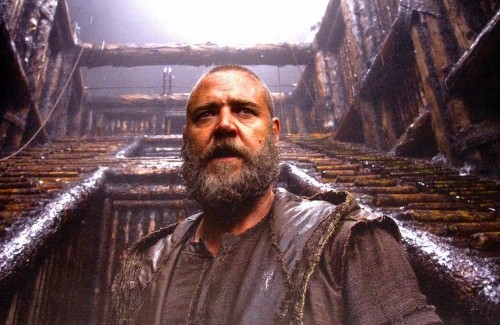By Greg Popil
At the end of the day, is anyone really more qualified to direct a movie about Noah and the Ark than Darren Aronofsky? More than a few eyebrows were raised when it was announced that the beloved indie director would be helming a big-budget Biblical epic, and people wondered if Aronofsky’s infamously brutal tendencies would be sanded down by a nervous studio. They needn’t have worried. The Old Testament, no matter what you believe in terms of its truth, is a famously savage book, full of murder, torture and pain. Who better to direct a movie from that source than the equally brutal, uncompromising director that sawed off Jared Leto’s arm, put a drill through Sean Gullette’s head and stuck Mickey Rourke’s hand in a meat grinder?
The new version of the story incorporates the Gnostic teaching that Noah (Russell Crowe) is the last descendent of Seth, Adam and Eve’s third son. All the other people on Earth are descendants of the wicked Cain, which is why they needed to be wiped out. He and his family embark on a long and perilous journey to visit his grandfather (Anthony Hopkins), who has a vision of the world wiped out by a massive flood, and starts his divinely inspired construction.
Aronofsky and his longtime writing partner Ari Handel repurpose the story of the flood as one of environmental necessity: Cain’s ancestors have left the Earth a barren wasteland, with the ground burned to ash and animals hunted to the brink of extinction. The filmmakers don’t hide from scientific discovery either, at one point telling the story of Genesis over the creation of the universe and the Big Bang (no wonder famed Creationist Ken Ham hated this movie). They also do not hide from the horror of the Great Flood: the reasons for it are given, and somewhat convincing (Noah’s vision of a city as a new Hell is intense), but Aronofsky does not sugarcoat that this is mass genocide on a global scale, and that Noah and his family could have saved a lot more people had they chose to do so.
The movie plays fast and loose with the original story, although at first they stick to the original scripture. Noah and his family are helped by a group of fallen angels, who were cursed by God (or The Creator, as he is called throughout the movie) to wander the earth crusted in mud and rock for disobeying and helping Cain. These are amazing creatures, shuffling, awkward rock monsters with multiple arms and eyes that glow like furnaces. The Ark and the gathering of the animals are similar marvels, particularly an army of snakes and lizards slithering towards salvation.
Once the flood is underway, the movie takes its biggest chances, and they don’t all work. Crowe’s Noah decides that humanity as a whole has been even more harshly judged than in the original tale, and prepares to take extreme measures to enact The Creator’s justice. This part of the film, while incredibly bold, drags a bit, and while Noah’s flaws as a man have always been apparent, his single-mindedness in the face of what appear to be some pretty bold-face miracles seem hard to justify.
The cast is also a mixed bag. Crowe is terrific in the titular role, more engaged under Aronofsky than he’s been in years (and at least partially redeeming himself for the hilariously awful “Winter’s Tale”). Similarly excellent is Logan Lerman as Noah’s conflicted middle son Ham, who is given a lot more good reasons for his breakaway from his father in this film. Unfortunately, Jennifer Connelly as Noah’s wife Naameh isn’t given much to do (other than support Crowe as he listens to voices, not unlike what she won an Oscar for in “A Beautiful Mind”), and Emma Watson, despite some fantastic acting on her part, looks far too glam for a pre-historic Biblical epic, as does Douglas Booth as her husband Shem.
Unexpectedly, it is Ray Winstone that runs away with the movie. As Tubal-Cain, a descendent of Cain and king of whatever area of the world the movie is set in, Winstone takes what could have been a generic villain and brings a real sense of pathos and loneliness to the role. Tubal-Cain is a primitive human, simply living the best way he knows how, with no guidance from his creator. He accepts that the flood is coming, and dares to try and survive anyway, because hasn’t The Creator given him the will and strength to try and survive? It is these kinds of bold characterizations that will allow “Noah” to join Martin Scorsese’s “The Last Temptation of Christ” in the small pantheon of Biblical movies that challenge you to think about the stories themselves. It may not be quite up to “The Last Temptation of Christ’s” level of quality, but it is quite an achievement nonetheless.
Rating: 64/81




Leave a Reply